It’s not as simple as predicting the likeliest Montreal Canadiens call-ups, unfortunately. The NHL’s Taxi Squad rules add a new wrinkle to league play, with players forming one having to strike the right balance between helpfulness in a pinch and expendability in terms of their individual futures in their respective organizations.
In effect, the Canadiens need to select players whose developmental progress isn’t all that critical. So, in the eyes of Habs management, defenseman Cale Fleury and center Ryan Poehling may be ineligible due to the potential lack of playing time get (even if the 2020-21 American Hockey League season is set to start later on relative to the NHL one).
With a maximum of six players allowed, here are the likeliest Canadiens to form their Taxi Squad, one at each position:
Charlie Lindgren (G)
The new rules state the Canadiens must carry three goalies. That means either all three with the big club or the usual two on the roster and one on the Taxi Squad. Cayden Primeau’s emergence as the team’s top prospect in net has pushed Charlie Lindgren down on the depth chart, making him the logical choice.
Combined with his pending unrestricted-free-agent status and 24 games of NHL experience up to now, Lindgren’s simply the likeliest of the four potential goalies to be named to the Taxi Squad (Primeau, Vasili Demchenko, Michael McNiven). While neither Demchenko nor McNiven require waivers, there are disqualifying factors in each case.
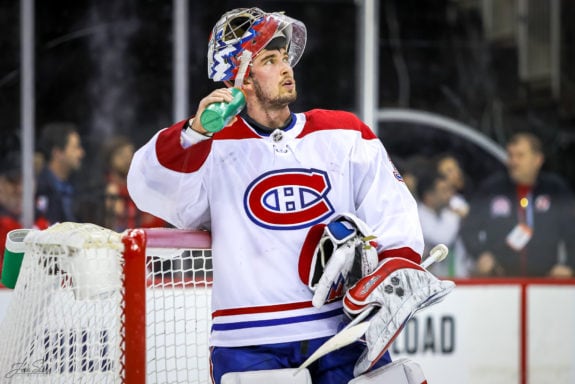
For instance, the 26-year-old Demchenko, who’s also a pending UFA, has yet to so much as play professionally in North America. He needs at least some experience. Meanwhile, the 23-year-old McNiven played most of his games in the ECHL last season. So, asking him to make the jump to NHL action, especially cold, would be too much.
In other words, Lindgren is in the same unenviable position, in limbo between the AHL and NHL, that has predominantly characterized his career up to now. Heading up the Taxi Squad for all intents and purposes is likely the furthest thing from an ideal scenario, considering Lindgren at one point was seen as a potential successor to Price. However, there’s just no avoiding it for either him or the Canadiens.
Alex Belzile (RW)
Forward Alex Belzile is a relative no-brainer to join the Taxi Squad. A 29-year-old career-minor-leaguer, Belzile deserves a reward for the eye-opening effort he put in over the course of the (first) six NHL games (of his career) that he played last postseason. Traveling with the Habs with the understanding he’ll be one of the first in line to draw into the lineup in case of injury might be a situation he would welcome with open arms… in sharp contrast to how Lindgren might justifiably feel about the situation.
There are of course drawbacks for Belzile too. For starters, the reward only comes in the form of acknowledgement, little else. Barring an actual promotion to the Habs, Belzile will be paid his AHL salary. Secondly, if he were to stay with the big club, the Laval Rocket would be left without the team’s 2018-19 leading scorer.
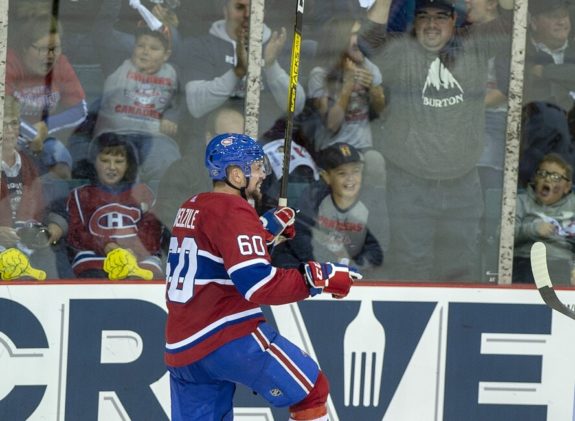
Regardless, it can’t be denied the Taxi Squad, which will dissolve at the end of the season, was born out of extraordinary circumstances. Desperate times call for desperate measures and, ultimately, with exception to the development of the team’s prized prospects, the ultimate goal here is to ensure the stability and success of the NHL team in question as much as possible, not its AHL affiliate. As a forward who’ll undeniably be chomping at the bit to help out wherever and whenever possible, Belzile unquestionably fits the bill here.
Jordan Weal (C)
Jordan Weal is almost a victim of his own success. More accurately though, he’s projected to be a victim of the Canadiens’ newfound depth up front and the salary cap.
An offensively capable and versatile fourth-liner, Weal got in 49 games with the Canadiens last season, including a relatively significant two minutes of power-play time each game. However, presumably without any Habs injuries to start the season, he’ll be in tough to make the opening-night lineup at the expense of the newly signed Tyler Toffoli, for example.
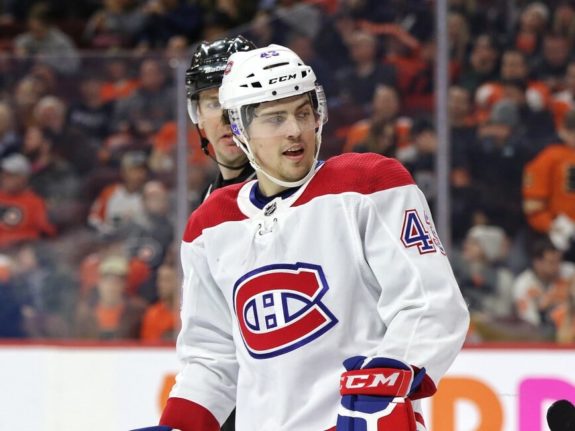
Furthermore, Weal’s $1.4 million cap hit is higher than that of the newly signed Michael Frolik. As the Habs are up against the salary cap, it simply makes sense to pay a projected 13th forward as little as possible, making burying Weal’s contract the most realistic option available, even if, having scored 15 points in limited action last season (and more significantly 10 points in 16 games the previous season), Weal is better-suited to the role. He’s also slated to become an unrestricted free agent at the end of the season, meaning, if Weal were to get claimed off waivers being loaned to the Taxi Squad, the loss would be fairly easy to swallow.
Paul Byron (LW)
Similar to Weal, Paul Byron is one player whose contract no longer fits with his projected role on the team due to the depth the Habs now have. However, circumstances are slightly different for Byron, who could still figure into the franchise’s future. Ideally Byron, with a cap hit of $3.4 million for each of the next three seasons, would still suit up as a fourth-liner to give it some scoring punch, considering his two 20-goal seasons with the Canadiens and his high career shooting percentage (17.4%). He’s also an expert penalty killer. He still technically can, if Artturi Lehkonen were to be demoted instead, but, considering the 25-year-old Lehkonen’s entering his prime, it’s probably best to play the latter as much as possible.
Either way, there is no escaping the cap. Much like the Frolik signing was interpreted as a way to get compliant by demoting Weal, the signing of Corey Perry for $750,000 should render Byron somewhat obsolete. They are of course vastly different players, but Perry just suits the Habs’ needs more… financially speaking anyway.
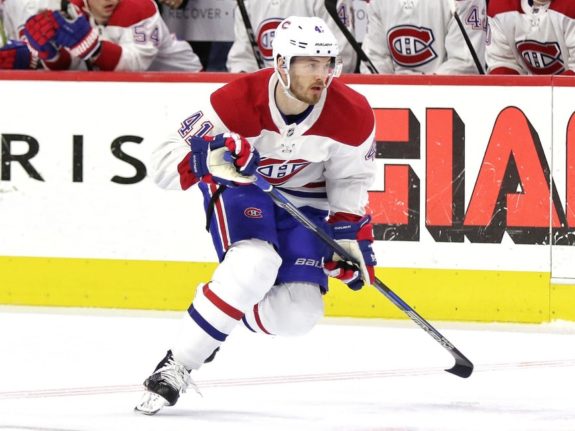
While that may seem harsh, the truth is both Weal and Byron were considered cap-casualty candidates before the Taxi Squad concept had been formalized. Any trade at all , even for future considerations, would have theoretically been welcome just to get rid of the contracts. Now that it’s official, the Habs don’t have to deal away either player, which would have been a tall order anyway since most teams also have cap issues now. Instead the Canadiens can keep each of them in the fold in some capacity.
In Byron’s case, considering he has top-nine upside, he still has a lot to offer the Habs past this season. As Weal, Frolik and Perry (and Tomas Tatar, Phillip Danault and Joel Armia) all have one year left on their contracts, by 2021-22 there may very well be cap room for Byron once again.
Noah Juulsen (RD)
If the Canadiens absolutely have to have a right-handed defenseman on the Taxi Squad, the only real option is Noah Juulsen. However, they’d be infinitely more likely to simply not cut Juulsen from the team out of training camp at all, considering he’s no longer waiver-exempt.
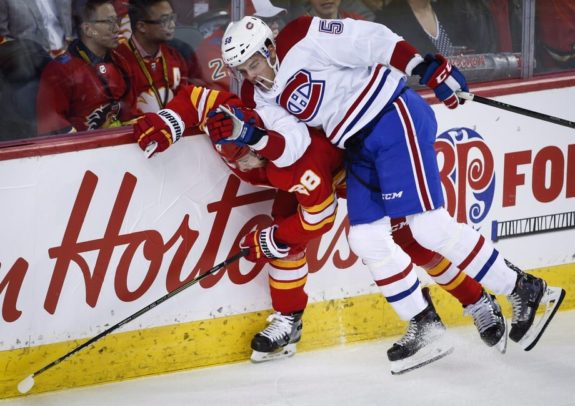
Ultimately, as a 23-year-old former first-round pick, Juulsen needs to play, much like fellow-righties Cale Fleury and Josh Brook. Juulsen’s waiver status just makes it likely the Habs keep him in the NHL as a sixth or seventh defenseman.
It should be pointed out the Habs don’t necessarily need six players, let alone a single player per position. They could opt to try to pass Juulsen through waivers anyway, get him more playing with the Rocket. In that same mindset, Belzile could be sent down as well, so as to leave the Rocket with some talent and leave the Habs with the minimum four Taxi Squad players.
Going the other way, they could choose to keep multiple left-handed defensemen on the Taxi Squad instead, for example Rocket captain Xavier Ouellet and/or Gustav Olofsson, to each of whom the Habs have turned in the past when injuries on defense have arisen. They’re each decent options, but not the likeliest.
Brett Kulak (LD)
On the left side, Brett Kulak is projected to be the odd many out, with the acquisition of Joel Edmundson. Edmundson, Ben Chiarot and Alexander Romanov should fill the three top spots, leaving Kulak as a potential seventh defenseman, which would be the perfect role for him based on his skill set… just not his $1.85 million cap hit.

Needless to say, there are more cost-effective options. Burying Kulak’s contract is one of them. By putting Kulak, Byron and Weal on the Taxi Squad, three players, who, normally speaking, would make the final roster, the Habs are projected to fit quasi-comfortably under the cap.
Assuming Jake Evans gets promoted to fill the fourth-line-center slot and Juulsen becomes the seventh defenseman, the Habs should have a cap hit of $80,841,309, even taking into account all the buried cap hits (per CapFriendly’s Armchair-GM tool). That’s of course assuming Canadiens general manager Marc Bergevin doesn’t go out and sign anyone else.
It’s admittedly not the $1.5-2 million cushion Bergevin envisioned initially. However, the fact that there is a Taxi Squad to begin with effectively negates the need for a cushion anyway.